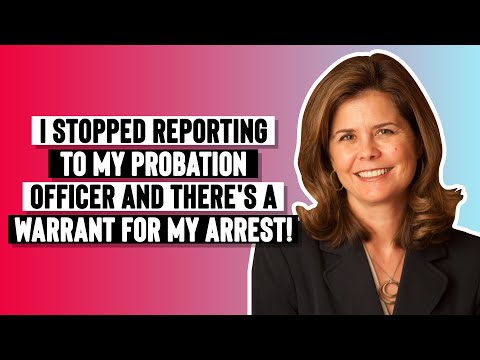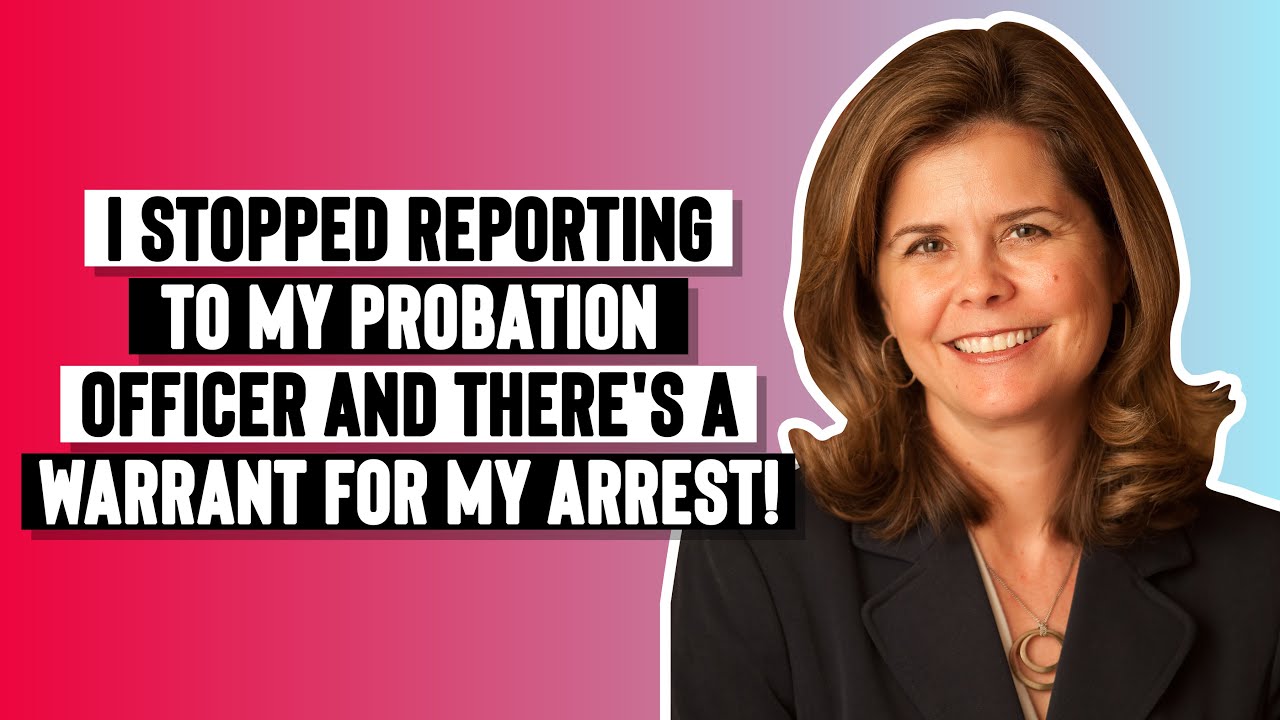Discover the Consequences of Having a Warrant for Probation Violation: Have you ever wondered what could happen if you find yourself with a warrant for probation violation? Brace yourself for a rollercoaster of legal troubles that can arise as a result. When you violate the terms of your probation, whether it’s by failing a drug test, missing a court appearance, or committing another offense, the consequences can be severe. Firstly, a warrant may be issued for your arrest, putting you at risk of being apprehended by law enforcement at any time. This can lead to incarceration and a lengthy legal process. Additionally, a probation violation can result in a revocation of your probation, meaning that you may face the original penalties for the crime you were initially convicted of. This could include fines, community service, or even a prison sentence. It is crucial to take any warrant for probation violation seriously and seek legal counsel immediately to explore your options and potential defenses. Remember, addressing the issue head-on can help mitigate the consequences and pave the way for a better future. Don’t let a warrant for probation violation derail your life; take action now!

Consequences of a Warrant for Probation Violation
| Consequence | Description |
|---|---|
| Arrest | When a warrant is issued for probation violation, the individual may be subject to arrest by law enforcement officers. This can occur at any time, often leading to an immediate loss of personal freedom. |
| Jail Time | Upon arrest, the individual may be held in jail until a court appearance is scheduled. The length of stay can vary depending on the severity of the violation, prior criminal record, and the court’s discretion. |
| Revocation of Probation | Once a warrant is issued, it signifies a failure to comply with the terms and conditions set forth by the court. As a result, probation can be revoked, leading to the individual being returned to custody to complete the remainder of their original sentence. |
| Additional Penalties | Violating probation can result in additional penalties being imposed by the court, such as fines, community service, mandatory counseling, or extended probationary period. These consequences aim to deter future violations and ensure compliance with court orders. |
| Loss of Privileges | A warrant for probation violation may lead to the loss of certain privileges granted during probation. These can include the ability to travel, possess firearms, consume alcohol, or associate with individuals involved in criminal activities. |
| Impacted Future Opportunities | A warrant for probation violation can have long-lasting consequences, impacting future opportunities such as employment prospects, professional licensing, educational opportunities, and even housing options. Background checks routinely reveal such infractions, thus potentially limiting one’s future prospects. |
| Increased Supervision | Following a warrant for probation violation, individuals who are granted a second chance may face increased supervision upon release. This can involve stricter reporting requirements, mandatory drug testing, regular check-ins with probation officers, or even enrollment in rehabilitation programs. |
“Evading Probation: Unveiling the Consequences of Ignoring Your Officer”
What Happens if You Have a Warrant for Probation Violation
Probation is often offered as an alternative to incarceration, allowing individuals to serve their sentences in the community while under supervision. However, if you violate the terms of your probation, you may find yourself facing a warrant for probation violation. This can have serious consequences and it is important to understand what may happen if you find yourself in this situation.
1. Issuance of an Arrest Warrant
When you violate the terms of your probation, your probation officer has the authority to issue a warrant for your arrest. This means that law enforcement agencies will actively search for you in order to take you into custody. The warrant will specify the reasons for the violation, and it is crucial that you understand these reasons in order to address them properly.
If you are arrested due to a probation violation warrant, you will be brought before a judge to explain your actions. The judge will then determine whether or not you indeed violated the terms of your probation.
2. Potential Revocation of Probation
If the judge finds that you have violated the terms of your probation, they may decide to revoke your probation. This means that you will be taken off probation and may be subject to the original sentence that was suspended, which could include imprisonment. However, the judge also has the discretion to impose alternative sanctions, such as extending the length of your probation or requiring additional rehabilitative programs.
It is important to note that the judge considers various factors when deciding whether to revoke probation, including the seriousness of the violation, any previous violations, and your overall compliance with the terms of probation up until that point.
3. Potential Consequences
Being found in violation of probation can have serious consequences. If your probation is revoked, you may be required to serve the remainder of your original sentence in jail or prison. This can be particularly challenging if you were initially given probation as an alternative to incarceration.
Additionally, a probation violation can have long-lasting effects on your criminal record and future opportunities. It can make it more difficult to find employment, housing, or obtain loans. It may also result in the loss of certain privileges, such as the right to possess firearms or travel freely.
4. Legal Representation
When facing a warrant for probation violation, it is crucial to seek legal representation. A qualified attorney can help you understand your rights, navigate the legal process, and advocate on your behalf. They can assist in presenting your case to the judge, providing evidence or mitigating circumstances that may help reduce the consequences you face.
Having legal representation can make a significant difference in the outcome of your case, as an attorney will have the knowledge and experience to navigate the complexities of the legal system.
5. Steps to Avoid Probation Violation
While it is important to understand the consequences of a probation violation, it is equally important to take steps to avoid violating probation in the first place. Some key strategies to consider include:
– Understanding the terms of your probation and following them closely. Make sure you fully comprehend what is expected of you and seek clarification if needed.
– Communicating with your probation officer regularly and honestly. Keep them updated on any changes in your circumstances and address any concerns or difficulties you may be facing.
– Seeking support from friends, family, or support groups. They can provide guidance and help you stay on track during your probationary period.
– Avoiding situations that may increase the risk of violating probation, such as associating with individuals involved in criminal activities or engaging in substance abuse.
– Documenting your compliance with probation terms. Keep records of any completed programs, counseling sessions, or other requirements to demonstrate your commitment to rehabilitation.
By taking proactive measures to comply with the terms of your probation, you can greatly reduce the risk of violating probation and facing the potential consequences.
Conclusion
A warrant for probation violation can have serious ramifications, potentially leading to the revocation of probation and the imposition of the original sentence. It is important to take any probationary terms seriously, understand them fully, and seek legal representation if you find yourself facing a warrant for probation violation.
By staying compliant with the terms of probation and proactively addressing any challenges or concerns, you can increase the likelihood of successfully completing your probationary period and avoiding further legal complications.
Consequences of Having a Warrant for Probation Violation:
Frequently Asked Questions
What happens if I have a warrant for probation violation?
How do I know if there is a warrant for my probation violation?
What should I do if I have a warrant for probation violation?
1. Consult with an attorney: Seek legal advice from an experienced criminal defense attorney who can guide you through the process and protect your rights.
2. Turn yourself in: Contact the appropriate law enforcement agency or the court and arrange to surrender yourself. It is recommended to have your attorney present during this process.
3. Prepare for court: Work with your attorney to gather evidence and build a strong defense strategy. Attend all court hearings and comply with any requirements set by the court.
4. Comply with probation terms: If your probation is not revoked, make sure to strictly adhere to all the terms and conditions going forward.
By taking these steps, you can demonstrate your willingness to address the violation and increase the chances of a favorable outcome in your case.

